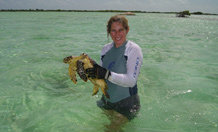
Dr Annette Broderick
University team to lead project to safeguard Ascension Island's wildlife
A University of Exeter team will deliver an ambitious programme to protect the unique flora and fauna of Ascension Island.
The researchers, from the University’s Centre for Ecology and Conservation at the Cornwall Campus, have been awarded £300,000 from Defra’s Darwin Initiative to lead this pioneering project in partnership with Ascension Island Government.
A UK Overseas Territory in the South Atlantic Ocean, Ascension Island is home to the second-largest population of marine turtles in the Atlantic. It has a number of other rare and endemic plants, fish and seabirds, as well as many invasive species. It also has ambitions to boost its economy through activities such as fishing and ecotourism, which depend on wildlife. Despite this, the island’s biodiversity is not well understood and there is no comprehensive management plan in place to protect it.
The University of Exeter will lead an international team, including the Centre for Ecology and Hydrology, Queen Mary University London, the Royal Society for the Protection of Birds, Royal Botanic Gardens Kew, University of Lund Sweden, to develop the island’s first Biodiversity Action Plan. This will include the first ever full inventory of all its plant and animal species. Their research will reveal the threats to particular species and will suggest ways in which to protect them. Working in partnership with the Ascension Island Conservation Office, they will deliver the plan and engage with people living on the Island to raise awareness of the importance of the Island’s biodiversity.
Monitoring marine life will be particularly challenging and the team will use satellite tracking devices to capture the movements of marine turtles and seabirds, as well as employing assistance from local fisheries to monitor sea life. They will also test the use of remote cameras for monitoring endangered plants.
Dr Annette Broderick of the University of Exeter’s Centre for Ecology and Conservation at the Cornwall Campus said: “This is a fantastic opportunity to develop a really comprehensive and practical approach to protecting wildlife on Ascension Island. We have already spent a lot of time working with marine turtles on this beautiful island and we are privileged to have the opportunity to make a real difference to the people and wildlife living there. The UK Overseas Territories are extremely important for biodiversity and it is great that the UK Government is supporting projects such as this.”
This is the fifth Darwin Initiative grant won by Professor Brendan Godley and Dr Annette Broderick. Previous grants have enabled them to work with sea turtles and other marine life in the Cayman Islands, British Virgin Islands, Gabon and Peru.
Professor Brendan Godley of the University of Exeter said: “We are thrilled to have been successful once again with Defra’s Darwin Initiative. By working with local people and a number of international partners, we will establish a long-term approach to managing the Island’s biodiversity, which will live on beyond our project.”
The Darwin Initiative, which has focused on protecting some of the world’s rarest and vulnerable species for two decades, is awarding £8.5 million to a total of 33 new projects in 2012. Since its launch in 1992 at the Earth Summit in Rio, the Darwin Initiative has committed £88 million to 762 projects in over 150 countries.
Speaking at London Zoo during a celebration to mark the 20th anniversary of the Darwin Initiative, Environment Secretary Caroline Spelman said: “I am proud of the UK’s ongoing commitment to international conservation, and I’m delighted to announce that the Government is putting more funds into protecting vulnerable species. Over the last 20 years the Darwin Initiative has helped some of the world’s poorest countries protect some of the most important wildlife on the planet.
“We have seen the Darwin Initiative deliver many success stories, and I believe it will help us achieve our ambition of being the first generation to leave the environment in a better condition than we found it.”
Date: 13 March 2012
